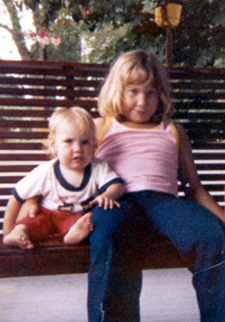According to the developmental biologist Jean Piaget, children below the age of 7 are incapable of understanding moral principles. Instead, they adopt the simple do's and don'ts imposed by authority. In other words, they understand right and wrong about as well as a dog. I happen to know this is true, because I remember some questionable things I did as a child, as well as exactly what I was thinking.
When I was about 4, I helped my parents choose new sheets for my bed. I chose a cheery pattern: blue polka dots and multi-colored miniature flowers on a white background. Perfect for a little girl's room. Perfect, that is, until naptime.
Coincidentally, that same day I had discovered my mom's sewing shears. They were amazing. After cutting off a lock of my hair, which came off with an easy snip, I tried them on my sheets. With the merest squeeze of my small hand, I sliced a neat slit into the middle of the fitted sheet. "Wow, that was easy! I wonder if it will cut here... and here... and here?"
As my orgie of cutting waned, a thought slowly formed. Not "this was wrong; I shouldn't have ruined my new sheets." Instead, I thought, "Uh-oh. Mom might not like this." I reasoned that she didn't need to know about my crime. After all, the sheets were covered by the bedspread; she'd never see them. I was right, but only momentarily.
So when Mom did, inevitably, discover my mutilated sheets, instead of being moved by her frustrated screams of "Why? Why?" I only thought, "How did she find out?"
Of course, the brand-new sheets had to go, and Mom bought me plain, boring sheets to replace them. She kept the pillow cases, though, forever a mismatched reminder of my momentarily flirtation with sharpness. And while, as an adult, I do regret the distress I caused my mom, I still remember that moment of bliss as those silver shears glinted in the afternoon sun, slicing so easily through fresh fabric.
Perhaps a better example comes from a few years later. In second grade, we kept all our books and supplies in our home-room desks, where we spent most of the day. But for certain subjects, we swapped classrooms and, therefore, desks.
I spent part of the day at Jesse Clayton's desk, and while some of the desks opened at the top, his had an open back. This made it extremely easy — or so I was told — for students to hide cheat sheets. It also meant that, as long as you kept your attention riveted on the teacher, she'd never guess what your hands might be doing inside the desk.
One day, I was bored, so I felt around inside Jesse's desk. He had left his crayons loose. So much the better for surreptitious coloring. Without looking, I grabbed one crayon after another and drew an unseen picture on some paper I found inside the desk.
The next day, I was sitting in my home room when the other teacher stormed in, holding a sniffling Jesse by the hand. Waving a piece of paper, she pronounced my name loudly. (Our elementary school teachers believed in public humiliation as punishment.) "Did you do this?" she demanded. The piece of paper she waved furiously was covered in writing and defaced with brown and green squiggles. Clearly, I'd been drawing on one of Jesse's homework assignments.
"Yes," I reluctantly admitted. "I did that."
But did I look at towheaded Jesse, his freckled face pink from crying, and think, "How terrible! Look what I've done to him"? Did I regret violating his trust, and the trust of the teacher? Did I imagine how I'd feel if someone had defaced my homework assignment? No. None of the above. Instead, I mused, "I thought it would be prettier."
As an adult, I look back with chagrin at this incident, but I also remember the creative glee of that wanton moment, along with the bitter disappointment when my imagined art turned out to be crude vandalism.
So I can say with conviction that Piaget was right. In our earliest days, we roam the earth, as willfully oblivious as the wind. We color between the lines, not because it suits our aesthetic, but because we are told. At heart, we long to scribble in the dark.


